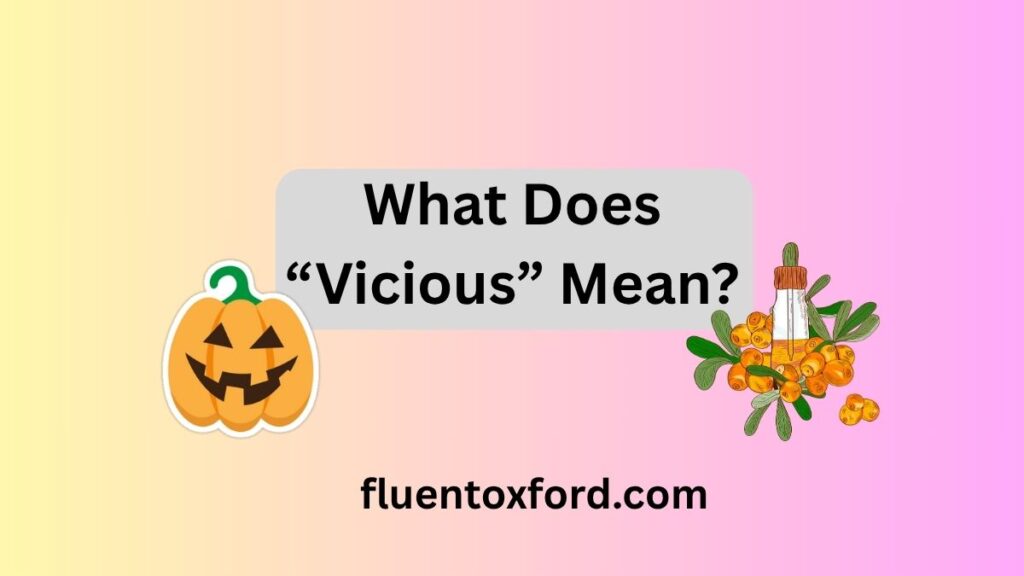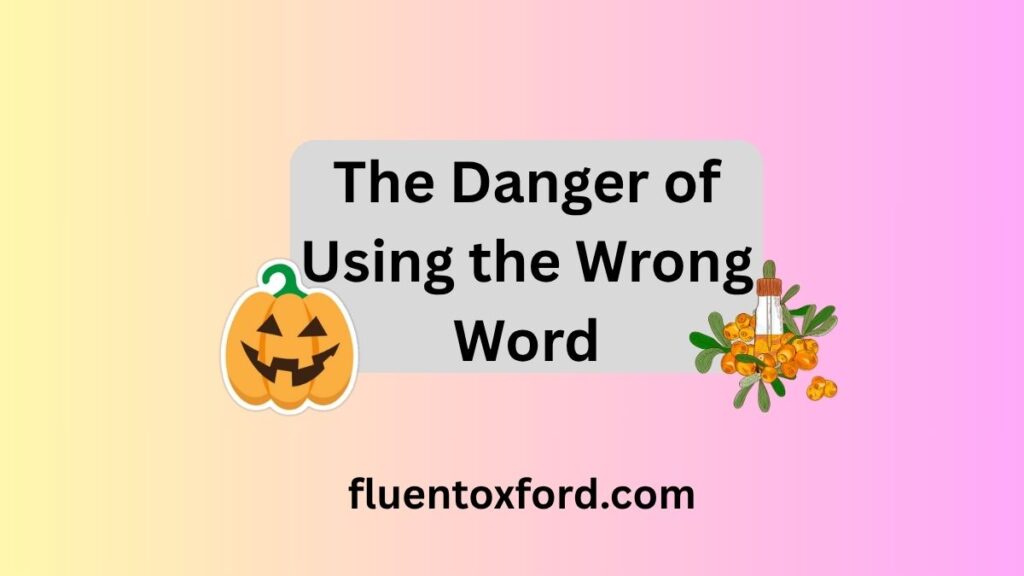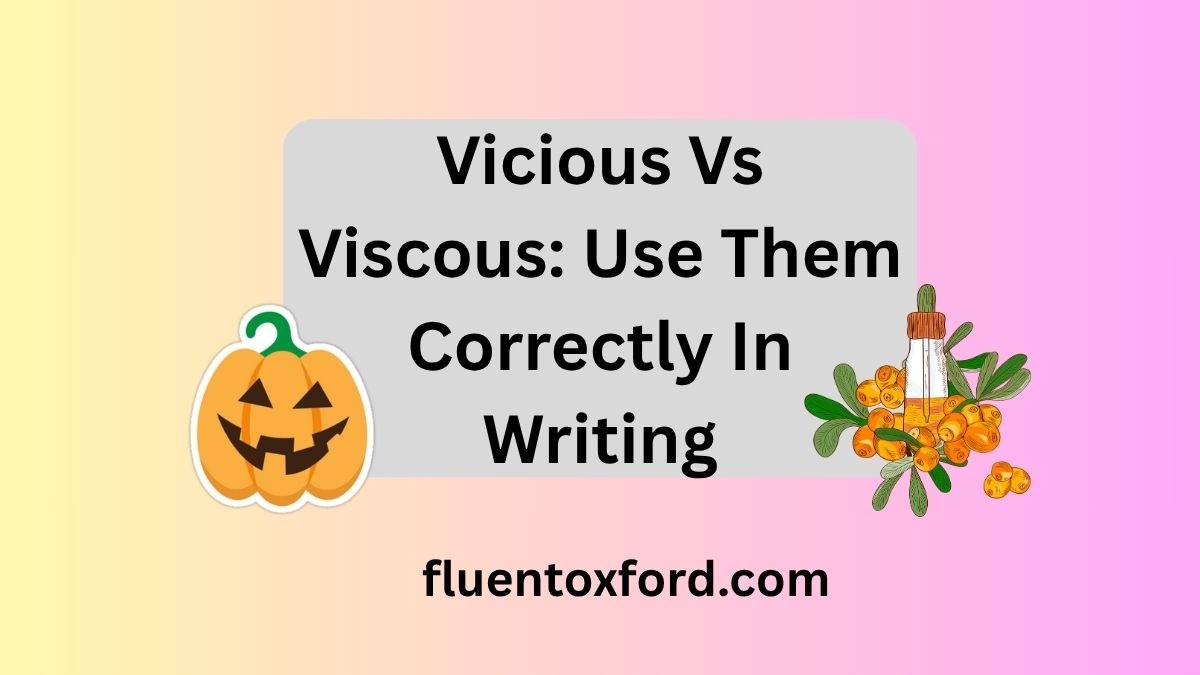The phrase “Vicious vs Viscous: Use Them Correctly” refers to the proper understanding and application of two commonly confused words in the English language. “Vicious” describes something cruel, violent, or aggressive, often used in reference to behavior or character. In contrast, “viscous” refers to a thick, sticky consistency of a substance, such as honey or oil. Despite sounding similar, their meanings are entirely unrelated, making their misuse a common error among writers.
Mastering precise language not only sharpens your writing but also elevates your credibility. Many readers quickly notice misused words, and a mix-up between “vicious” and “viscous” can distract or even confuse your audience. Polished writing requires a clear grasp of vocabulary, especially with words that look or sound similar but carry drastically different meanings. This subtle linguistic challenge can turn a good writer into a great one when handled correctly.
Understanding Vicious vs Viscous: Use Them Correctly ensures clarity and accuracy in both casual and professional writing. Whether crafting stories, reports, or academic content, distinguishing these two terms is essential. The ability to Use Them Correctly adds polish and precision, helping you avoid awkward or misleading phrasing. Explore this guide to fully grasp the subtle but important distinction between “vicious” and “viscous,” and ensure you always get it right when it counts.
Why Do People Confuse “Vicious” and “Viscous”?
The root of the confusion is mostly phonetic. Both words start with a “v,” have two syllables, and end with the “-ous” sound. To a quick ear, they can sound almost identical — especially in fast or unclear speech.
Consequently, this leads to mistakes in writing and editing; writers intending to describe a cruel person might accidentally write “viscous man,” while someone describing thick syrup could mistakenly type “vicious fluid.” This isn’t just a typo — it’s a semantic distinction that completely changes the meaning of the sentence..
Quick Answer: Vicious vs Viscous At a Glance
Here’s a simple way to remember it:
| Word | Meaning | Type | Common Contexts | Pronunciation |
| Vicious | Deliberately cruel or violent | Adjective | Behavior, speech, animals | /ˈvɪʃ.əs/ (vish-us) |
| Viscous | Thick and sticky in texture | Adjective | Liquids, substances | /ˈvɪs.kəs/ (vis-kus) |
Think of vicious as related to violence, and viscous as something that’s slow-flowing or gooey.
What Does “Vicious” Mean?

Vicious is an adjective used to describe aggressive behavior, harmful intentions, or cruel actions. It’s emotionally charged and conveys negativity.
🧠 Vicious Meaning:
“Vicious” means deliberately cruel, violent, or immoral. It’s often used to describe people, actions, or animals that are dangerous or malicious.
✅ Examples of Vicious Behavior:
- A brutal attack in the news described as a “vicious assault.”
- A cruel person spreading malicious gossip.
- A dog known for its vicious temper.
✍️ How to Use Vicious in a Sentence:
- “The attacker delivered a vicious blow to his opponent.”
- “They were trapped in a vicious cycle of debt and despair.”
💬 Common Expressions with Vicious:
- Vicious cycle
- Vicious rumor
- Vicious attack
These all involve some kind of emotional intensity or harmful situation.
What Does “Viscous” Mean?
On the flip side, viscous has nothing to do with people, emotions, or behavior. It’s all about liquid texture and fluid dynamics.
🧠 Viscous Meaning:
“Viscous” describes a thick, sticky consistency that resists flow. It’s used to characterize liquids or semi-liquids.
It comes up often in science, cooking, engineering, and descriptive writing.
🧪 Viscous Liquid Examples:
- Honey dribbling slowly from a spoon.
- Motor oil in winter.
- Syrupy fluids like molasses or tar.
- Glue-like substances used in industrial processes.
✍️ How to Use Viscous in a Sentence:
- “The lava was thick and viscous, oozing slowly down the slope.”
- “Cold maple syrup becomes too viscous to pour easily.”
Vicious vs Viscous: How to Never Confuse Them Again
These sound-alike words may trip you up, but here’s how to remember them:
✅ Memory Tricks:
- Vicious has an “i” — think injury, intent to harm.
- Viscous has an “s” — think sludge, syrup, sticky.
🔍 Visual Cue Table:
| Word | Memory Hook | Visual Image |
| Vicious | “I” for injury | A snarling dog ready to bite |
| Viscous | “S” for syrup | Honey dripping in slow motion |
Examples in Context

Vicious (Cruel Behavior Adjective)
- The vicious dog barked wildly and lunged at anyone who passed by.
- In another instance, she faced a vicious online attack after sharing her opinion.
- Moreover, his vicious remarks left everyone in the room feeling uncomfortable.
- Specifically, the bully was known for his vicious treatment of younger students.
- As a result, a vicious argument broke out between the two former friends.
- Notably, the movie showed a vicious villain who enjoyed causing pain.
- In fact, that was a vicious lie meant to hurt her reputation.
- Furthermore, he launched a vicious campaign to ruin his competitor’s image.
- In one case, the criminal committed a vicious assault on an innocent passerby.
- Clearly, her vicious glare made it clear she wasn’t ready to forgive.
- During the meeting, she unleashed a vicious tirade against her coworkers.
- Lastly, online trolls can be vicious, hiding behind fake profiles.
Viscous (Thick Liquid Adjective)
- For instance, the syrup was so viscous it moved slowly down the side of the bottle.
- In cold weather, oil becomes more viscous, making it harder to pour.
- After the hike, a layer of viscous mud clung to their boots.
- In the lab, the scientist measured the viscous texture of the new chemical mixture.
- Meanwhile, the lava flowed in a slow, viscous stream down the mountainside.
- To make painting easier, he stirred the viscous paint thoroughly.
- During breakfast, the honey was too viscous to drizzle and needed warming.
- As a result, a thick, viscous sauce coated the pasta, adding rich flavor.
- Over time, the motor became clogged with a viscous sludge that needed cleaning.
- Unfortunately, she spilled a viscous liquid on the counter that was hard to wipe off.
- In another example, the river became clogged with a viscous mixture of mud and debris.
- Finally, he stirred the viscous batter until it was smooth enough to pour.
Synonyms for Vicious and Viscous
Using the same word over and over? Expand your descriptive vocabulary with these rich alternatives.
🧨 Synonyms for Vicious:
| Word | Nuance |
| Brutal | Physically violent |
| Malicious | Intending to harm emotionally |
| Brutal | Wild, uncivilized cruelty |
| Fierce | Intense and aggressive |
| Wicked | Morally wrong |
🧬 Synonyms for Viscous:
| Word | Nuance |
| Syrupy | Sweet and sticky |
| Gooey | Thick, elastic texture |
| Gelatinous | Jellied, semi-solid |
| Slimy | Slippery and thick |
| Sticky | Adheres to surfaces |
Etymology: Where “Vicious” and “Viscous” Come From
Knowing where words come from helps solidify their meanings.
Etymology of Vicious
- Origin: Latin “vitiosus” meaning “full of faults” or “morally corrupt.”
- Related to the word vice, as in a moral weakness.
- In Middle English, “vicious” entered the language around the 14th century.
- Early uses of “vicious” referred more to moral corruption or sinful behavior.
- Over time, “vicious” evolved to describe cruelty, especially violent or aggressive behavior.
Etymology of Viscous
- Origin: Latin “viscosus”, from “viscum” (birdlime, a sticky substance).
- Related to glue-like materials and scientific terminology. “Viscous” entered the English language in the 14th century through Old French.
- In Latin, viscum was commonly used to describe thick, adhesive liquids.
- The original meaning of “viscous” was directly tied to natural substances that were thick or gummy.
- Over time, the word became more commonly used in scientific and technical contexts.
The Danger of Using the Wrong Word

Choosing the wrong word doesn’t just look bad — it confuses your audience.
🧠 Why It Matters:
- “Vicious liquid” makes no sense unless it’s metaphorical.
- “Viscous attack” sounds like someone was attacked with syrup.
✍️ Writing Tips Vocabulary:
- Always read your writing aloud — your ear will catch what your eye won’t.
- Use proofreading tools to highlight confusing adjectives.
- Replace a word if you’re even 10% unsure about its meaning.
Real-World Case Study: Confusion in Media
A food blogger once wrote:
“Be careful not to burn the caramel — it can become too vicious to work with.”
Naturally, readers were puzzled. How could caramel become aggressive? What she meant, of course, was viscous. This single-word mistake hurt the clarity of her instructions and damaged the post’s SEO due to irrelevant keyword context.
Conclusion
Learning the difference between similar-sounding words is important for clear writing. The phrase Vicious vs Viscous: Use Them Correctly reminds us how one small mistake can change the meaning of a sentence. “Vicious” means cruel or violent, while “viscous” means thick and sticky. They may sound alike, but they are used in very different ways.
Always double-check your words to avoid confusion. Using Vicious vs Viscous: Use Them Correctly will help your writing sound smart and clear. It shows you understand the words and care about what you write. With a little practice, you can easily remember the difference and use each word the right way.
FAQs
1. What is the main difference between vicious and viscous?
Vicious describes something cruel or violent, while viscous refers to a thick, sticky liquid consistency.
2. How do you pronounce “vicious” and “viscous”?
“Vicious” is pronounced /ˈvɪʃ.əs/ (VISH-us), and “viscous” is pronounced /ˈvɪs.kəs/ (VIS-kus).
3. Can a liquid ever be described as “vicious”?
No. Liquids can be viscous, but “vicious” only applies to behavior, animals, or actions, not physical textures.
4. What are common examples of viscous substances?
Honey, syrup, molasses, motor oil, and glue are all common viscous liquids.
5. Are vicious and viscous commonly confused in writing today?
Yes, especially among ESL learners and in online content, due to their similar spelling and sound—but the meanings are completely different.

As an admin at Fluent Oxford, Maida Queen is the driving force behind our vibrant learning community. With a deep passion for English language education, she ensures that our platform remains a dynamic, engaging, and supportive space for learners worldwide.
Maida expertly manages content, assists users with their grammar and fluency queries, and fosters an interactive environment where learning feels effortless and enjoyable. Whether you need guidance, motivation, or just a friendly face in the Fluent Oxford community, Maida is always there to help you reach your English language goals.








